Dubai: The ongoing “diplomatic marathon” between the Kingdom and its neighbors to the north and east represents the “Saudi-Asia moment”, according to Saudi geopolitical analyst Salman Al-Ansari.
“The kingdom is running such a beautiful marathon, and I like to call it the Saudi-Asia moment,” he said, following several diplomatic visits and agreements between Riyadh and Asian countries.
Appearing on Arab News’ weekly current affairs show, Al-Ansari explained how Saudi Arabia’s relationship with China and Russia should be viewed by its traditional allies in Washington, outlining the reasons behind the kingdom’s ambitions to build closer ties with Central Asian, Southeast Asian and Far Eastern economies.
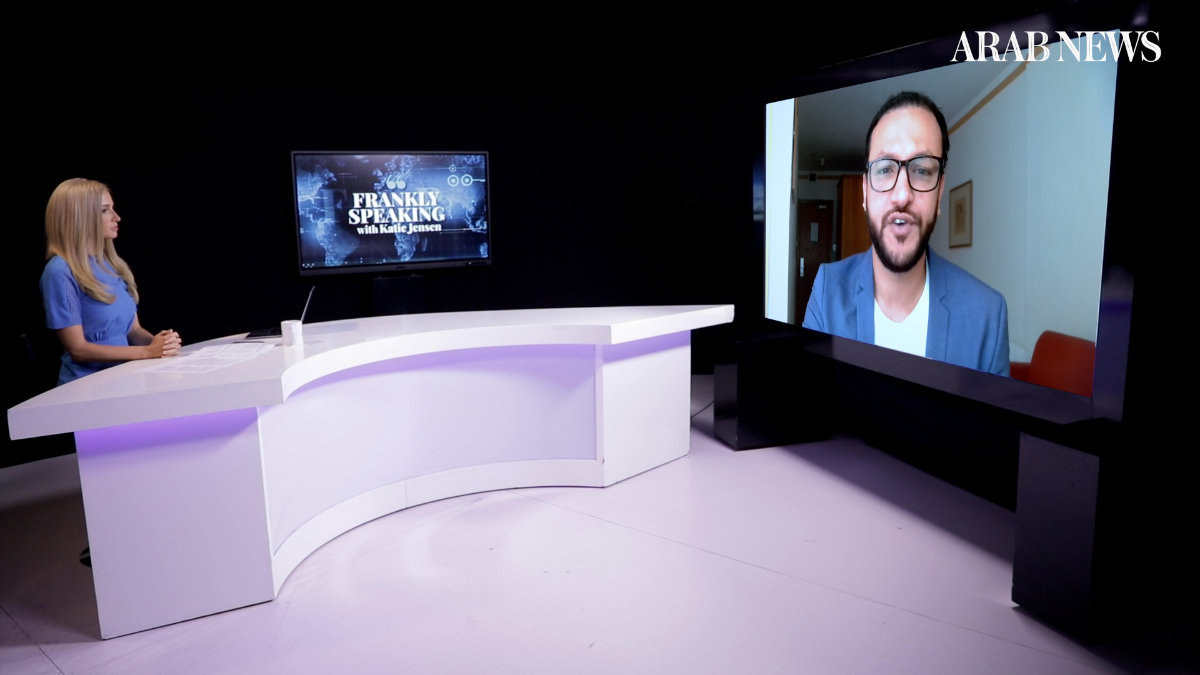
Saudi geopolitical analyst Salman Al-Ansari spoke to Katie Jensen, editor of Frankly Spin. (AN photo)
On Wednesday, Saudi Arabia became the 51st country to sign an Amity and Cooperation Agreement with the Association of Southeast Asian Nations. Saudi Arabia’s Foreign Minister Prince Faisal bin Farhan visited Jakarta.
The TAC was signed in 1976 as a set of guidelines governing inter-state relations in the region based on mutual respect for sovereignty, territorial integrity and non-interference in each other’s internal affairs.
10 ACN member states, including the influential Indonesia, Thailand, Malaysia, the Philippines and Singapore, are joining the agreement, as well as non-Southeast Asian countries.
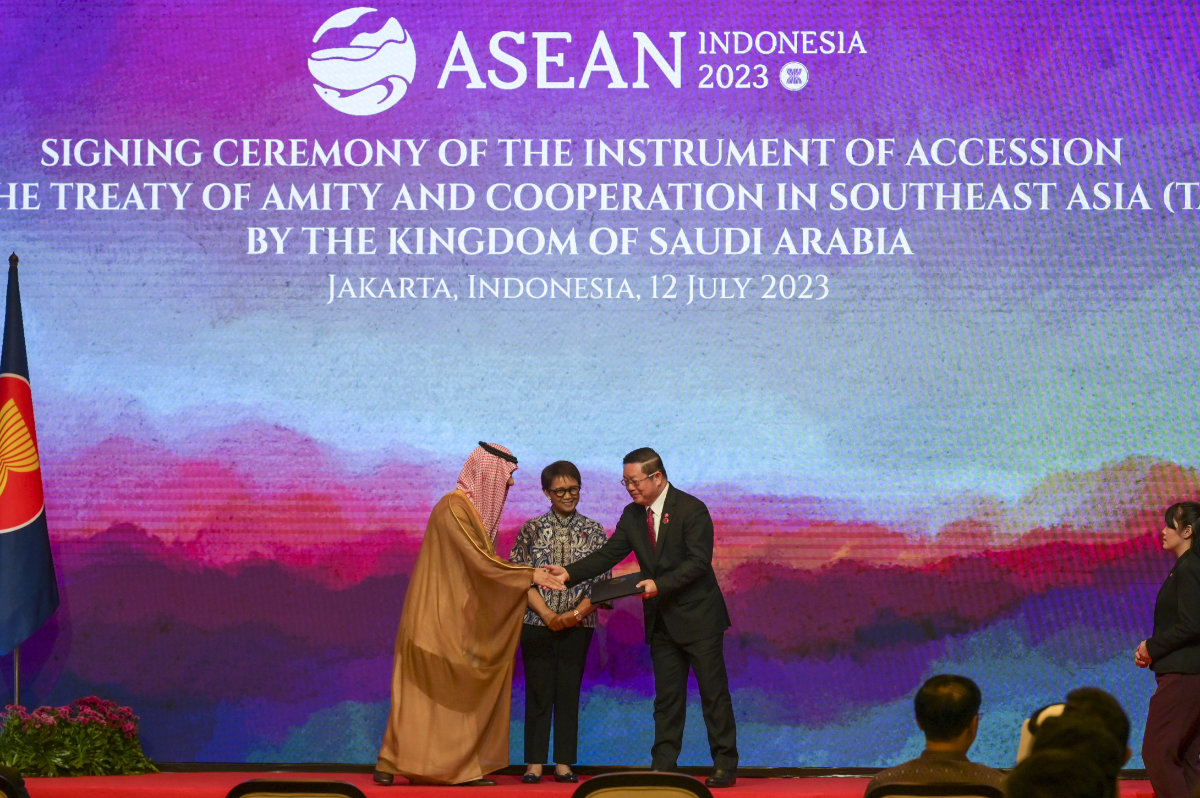
Saudi Arabia’s Foreign Minister Faisal bin Farhan (L), Indonesian Foreign Minister Retno Marsudi (R) and ASEAN Secretary-General Kao Kim Hur attend a signing ceremony for Saudi Arabia’s accession to the Treaty of Amity and Cooperation in Southeast Asia (TAC) in Jakarta, July 12, 2023.
China and India They first joined in 2003, and the US and EU joined in 2009. “This will definitely enhance the government’s bilateral relations with all ASEAN members,” Al-Ansari said. “That’s why I call it the Saudi-Asia period.
Another diplomatic highlight of the past month was Japanese Prime Minister Fumio Kishida’s official visit to the Middle East – his first since taking office in 2020. Between July 16 and 19, Kishida visited Saudi Arabia, the UAE and Qatar.
Although energy security was top of Kishida’s agenda during the visit, green technology initiatives and cooperation in technology and infrastructure were also highlighted.
“It was a very important visit,” Al-Ansari told “True Telling” host Katie Jensen. “More than 26 agreements signed between Japan and Saudi Arabia covered many different fields. And you can name the energy, water, advanced industries, technology and health sectors, as well as the financial sector.”
“So a lot is going on with regard to Saudi-Asia relations. And let’s not forget that the Central Asia-GCC meeting was held a few days ago for the first time where the two groups began to strengthen their ties,” he said.
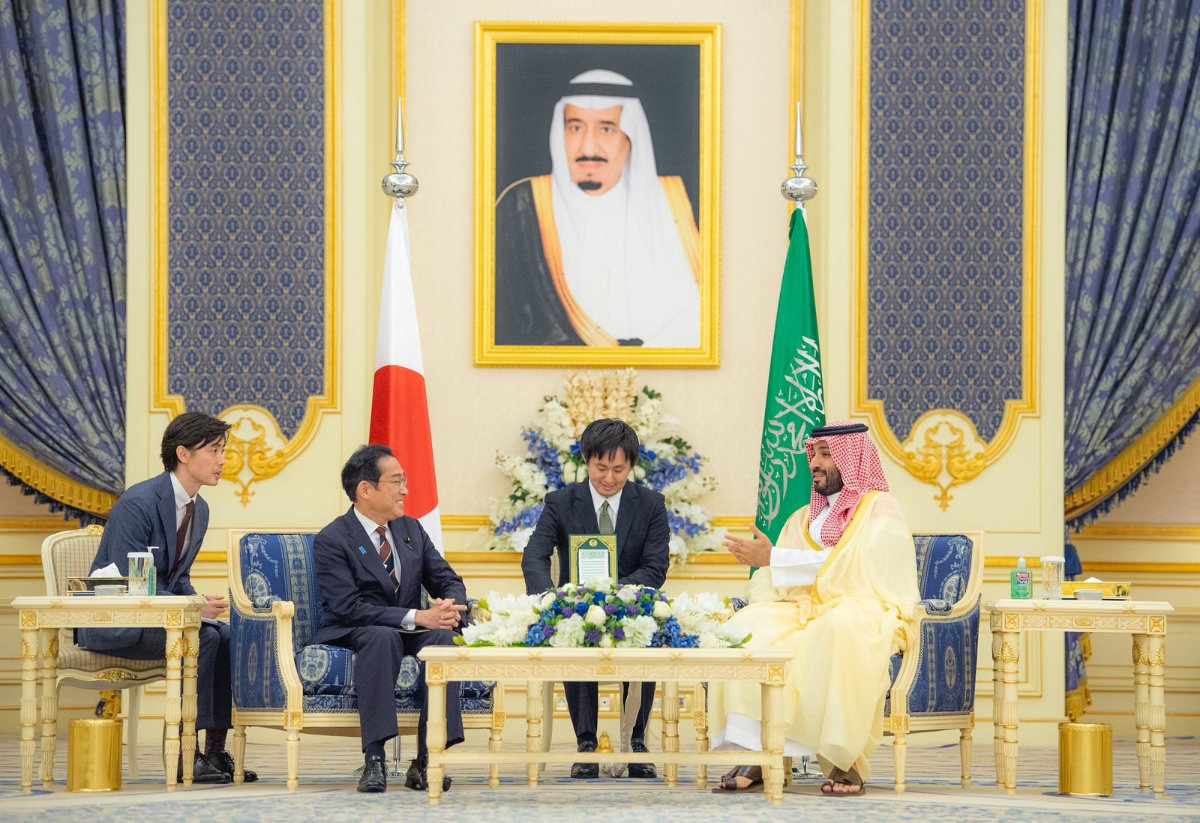
Crown Prince Mohammed bin Salman (R) of Saudi Arabia meets with Japanese Prime Minister Fumio Kishida (2nd L) at the Al-Salam Palace in Jeddah in 2018.
On July 19, the Gulf Cooperation Council – Central Asian Countries (GCC-C5) was held in the Saudi city of Jeddah, which will further strengthen the relationship between the two regional groups.
“Central Asian countries have never been on the Saudi radar like they are now,” Al-Ansari said, referring to the C5, which includes Kazakhstan, Uzbekistan, Tajikistan, Kyrgyzstan and Turkmenistan.
“These five nations are also among the most important countries in OPEC+. And there are massive solar power and electricity projects run by the Saudi Arabian government, particularly through ACWA Power Company, especially in Uzbekistan.
“This summit of the five Central Asian countries and the six GCC countries paves the way for more win-win cooperation and strengthens the strategic and economic interests of both blocs.”
“It’s Saudi-Asia Time”
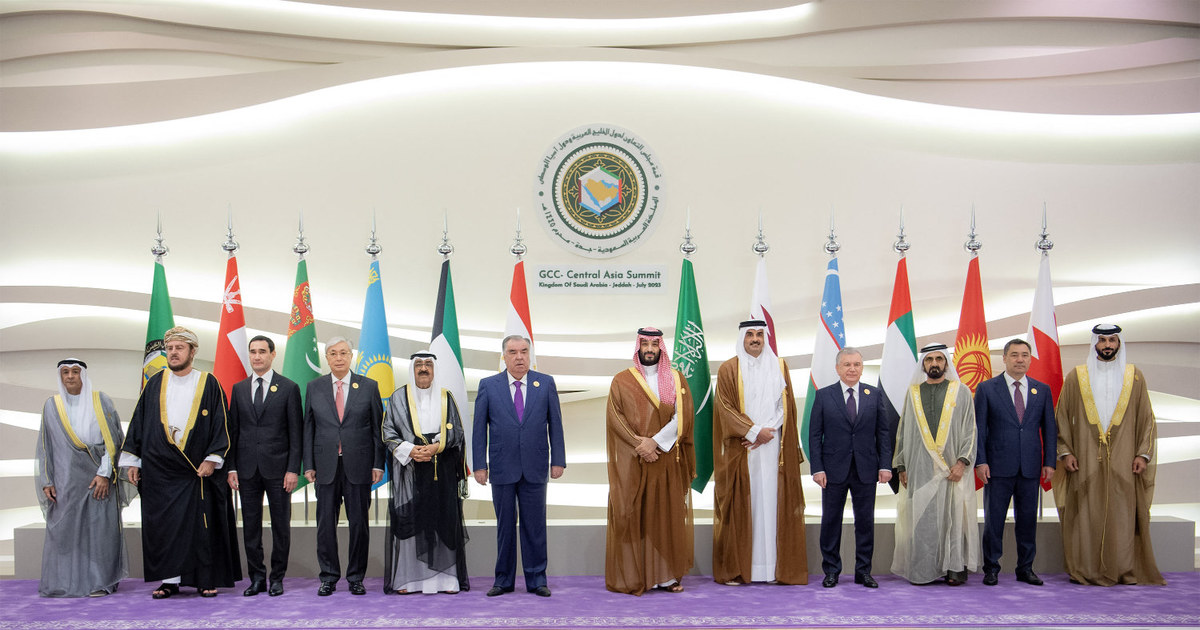
A family photo of the leaders of Saudi Arabia, Bahrain, Kuwait, Oman, Qatar, the United Arab Emirates, Kazakhstan, Tajikistan, Uzbekistan, Kyrgyzstan and Turkmenistan at the Gulf Cooperation Council-Central Asian Nations (GCC-C5) meeting in Jeddah on July 19, 2023 (SPA)
The kingdom’s eastward march is due in part to China’s emergence as a major energy importer and global powerhouse in manufacturing and technology.
China is Saudi Arabia’s largest trading partner, and the kingdom is China’s largest trading partner in the Middle East and North Africa, with bilateral energy trade and many manufactured goods.
But Beijing is taking the lead in Middle East diplomacy.
The March agreement between Saudi Arabia and Iran that paved the way for normalization of relations was brokered by China. Was that the beginning of an expanded role for China in the region?
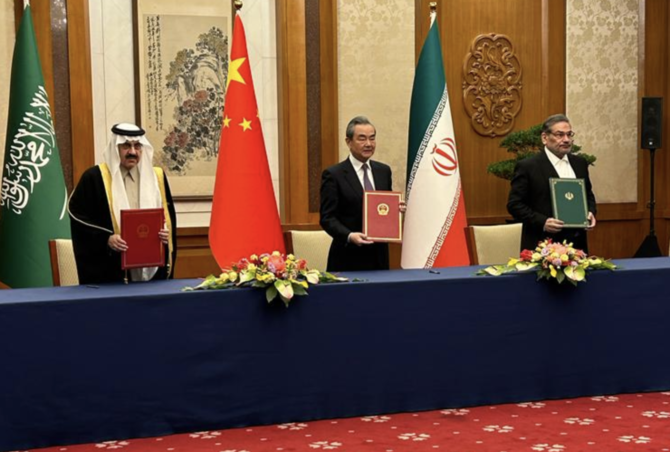
Iran’s top security official Ali Shamkhani (L) and Saudi Arabia’s National Security Adviser Musaad bin Mohammed Al-Aiban (R) show the document they signed in Beijing. (SPA file photo)
“(A few years ago) I remember, I had a friend, he’s a diplomat, he’s a GCC diplomat in Beijing, China, and I actually asked him, why don’t we push the Chinese to do something about Iran?” Al-Ansari said.
“And he told me that they always raise this question with (their Chinese counterparts), and they always talk about nothing but business.
“Therefore, now is the most important time for the Chinese government to focus not only on trade, but also on security arrangements and political mediation.
“I think it’s a big step for China. It is a big step for Iran. It is definitely a big step for GCC countries and Saudi Arabia.
Saudi Arabia’s deepening ties to non-Western powers have led politicians and analysts in Washington to speculate that Riyadh has chosen to side with allies like China and Russia.
Al-Ansari: As a sovereign nation, it is natural for Saudi Arabia to expand its diplomatic and commercial ties, but this does not mean that the kingdom has abandoned its vital strategic partnership with the United States.
At the same time, Washington should not try to interfere in the relations of sovereign countries or make a double standard, he said.
“The US is China’s largest trading partner. We should not be the way we decide how other nations do business and with whom they should do business,” Al-Ansari said.
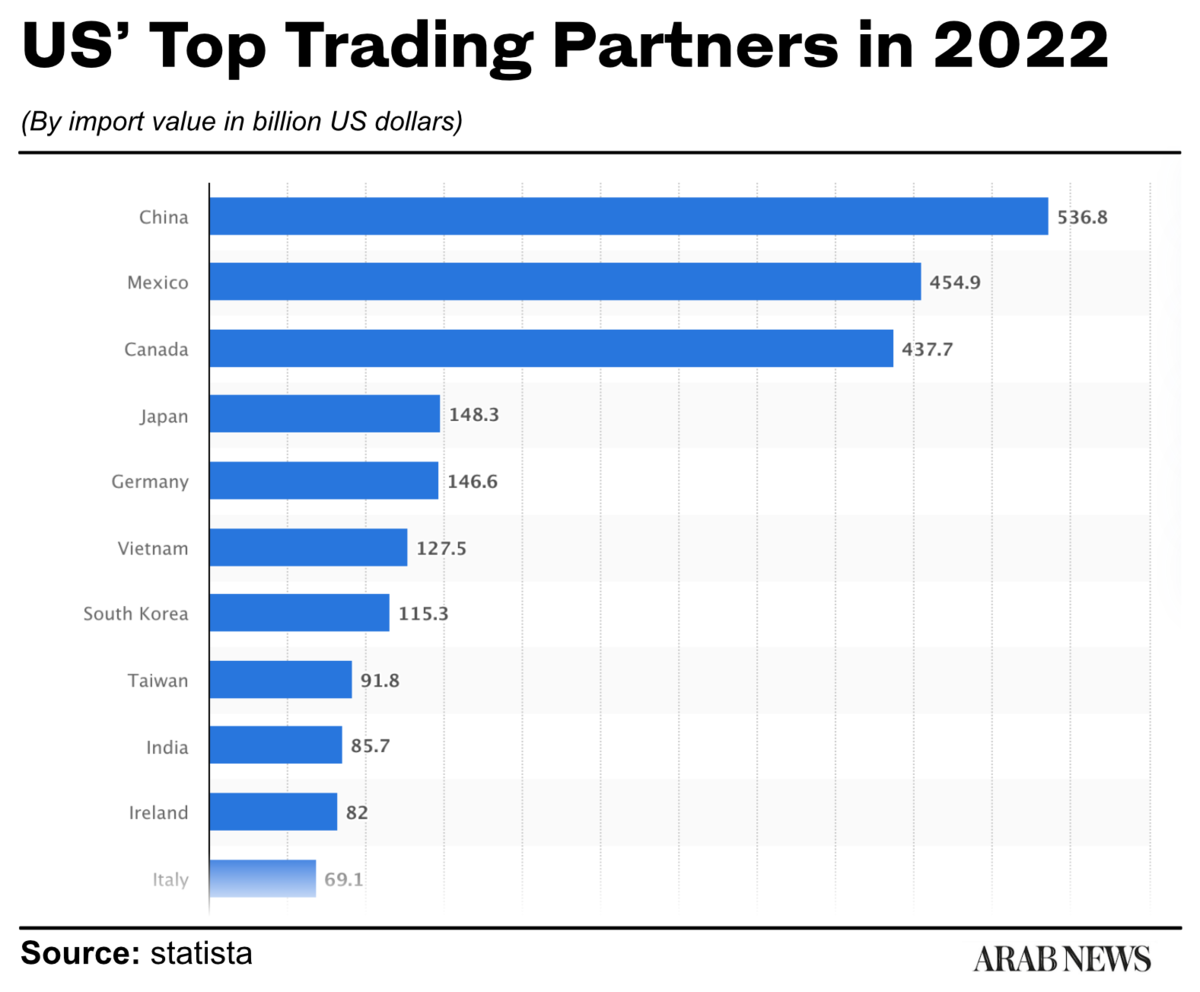
China is America’s largest trading partner and Washington’s obstruction of others from doing business with China is equivalent to two levels, Salman Al-Ansari said. (AN Infographic)
“Thirty years ago, China was the largest trading partner for 20 countries. Now, (this number is) more than 130 countries. So it is a reality on the ground. It is the factory of the world. Let’s work with China.
“China is not as evil as it is thought to be. We don’t want these kinds of double standards, and we don’t want this kind of zero-sum approach in the US.
“We want the world to live in harmony, and at the same time, whether it’s with China or Russia, with our European friends, with America, we want to have a win-win deal with everyone, and that’s the role that Saudi Arabia wants to play, to be an equal, to be in the middle and to do business with everyone.
According to Al-Ansari, Saudi Arabia’s importance on the idea of sovereignty is nothing new and the United States has nothing to fear from Riyadh’s unilateral diplomatic relations.
“The Saudis have always had the idea that sovereignty is the key to Saudi Arabia and to all countries interested in establishing friendship with Saudi Arabia,” he said. “The Saudis have not changed from jumping from partnership to partnership. That is not the way the kingdom works.
The Saudis and Americans fought communism together, fought terrorism together, and secured the world’s energy and economy together. And the Saudis are really committed to this very strategic and important relationship.
Salman Al-Ansari
“The Saudis have been pursuing their interests since their inception. So to begin with, the Saudis have been working with the Americans to confront major conflicts and the world’s major adversaries.
“The Saudis and Americans have fought communism together, fought terrorism together and secured the world’s energy and economy together.” And the Saudis are really committed to this very strategic and important relationship.
“Now, it is considered the second largest trade partner of the Saudi Arabian government to the US. It is considered to be the kingdom’s main strategic partner in terms of security. But as with absolutely any relationship, there are some differences.”
Also, Washington should not be concerned about Saudi Arabia’s relationship with Russia on oil, Al-Ansari said – this move is only to stabilize world energy markets due to the war in Ukraine and Western sanctions against Russian hydrocarbons.
“Now, maybe the Americans are upset that we are working with the Russians through OPEC+, but I don’t think they are concerned about this, because we are not there to help one country with another,” Al-Ansari said.
“We are there to stabilize the energy market. The one and only way to do that is by establishing an integrated system where we can work on demand and supply.”
Rejecting the notion of geopolitical alignment against the United States, he said, “I don’t think there is anyone who buys Saudi Arabia aligning itself with Russia in the OPEC decision.” It is outdated information thrown out by the US administration in a moment of anger. Then the media will talk about it.
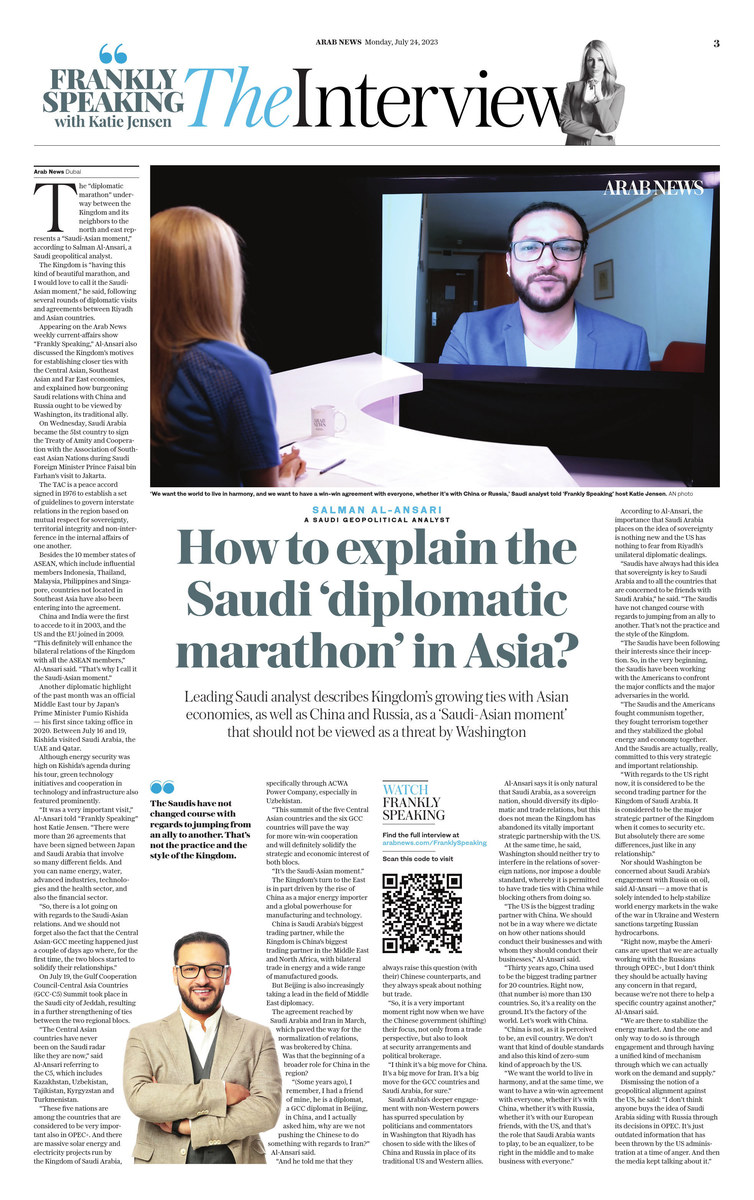
[ad_2]
